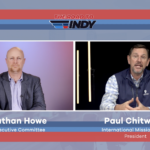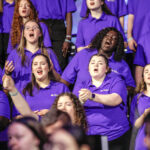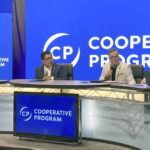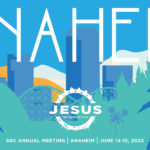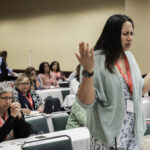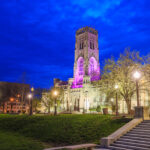
Leaders highlight SBC’s diversity
By Timothy Cockes
SBC Executive Committee staff members discussed the topic of “Diversity in the SBC” during the Vision 2025 stage on Wednesday, June 16, during the 2021 SBC Annual Meeting.
Willie McLaurin, vice president for Great Commission relations and mobilization for the Executive Committee, moderated the panel titled “When all God’s Children Get Together: Diversity in the SBC,” which discussed the importance of growing diversity in the convention as well as provided updates on particular Southern Baptist ethnic groups.
Each of the Asian, Hispanic and African ethnic groups also had their own separate panel discussions on the Vision Stage in the meeting’s exhibit hall. Summaries of those discussions are below, followed by video recordings of each panel mentioned in this article.
McLaurin began by stating the executive directors on the panel have a “laser sharp focus,” on the 22.3 percent of Southern Baptist churches that are ethnically and racially diverse.
Peter Yanes, EC executive director for Asian American relations and mobilization, said there are a variety of nationalities represented among Asian Americans and all of them are committed to working together with all Southern Baptists to fulfill the Great Commission.
“We’re so excited [EC President and CEO] Ronnie Floyd is highlighting diversity and encouraging churches to partner together,” Yanes said. “We have 27 Asian nationalities represented in the Southern Baptist Convention. It’s time for all churches across our convention to partner with us and reach all nations for Jesus Christ.”
Julio Arriola, EC executive director for Hispanic relations and mobilization, said the greatest need in ministry to Hispanics is church planting as the population of Hispanics in America is more than 60 million.
Arriola said he is encouraged by several developments including the discipleship of young Hispanic pastors and the beginning of degree programs fully in Spanish at SBC seminaries.
There have been several exciting updates recently among African American churches, according to EC Executive Director of African American Relations and Mobilization Charles Grant.
Updates include strengthen partnerships between African American churches and SBC entities, and the addition of George Liele day to the SBC calendar. Liele is known as the first Black Baptist missionary from the U.S.
Ashley Clayton, who serves as the EC’s executive director for church affiliation, praised the growing diversity in the SBC and encouraged every church to play a part in ethnic ministries by supporting the Cooperative Program and Vision 2025.
“What every church can do is invest in the Great Commission, and one of the best ways to do that is invest in the ministries of the Southern Baptist Convention through the Cooperative Program,” Clayton said.
“Vision 2025 challenges churches to prayerfully consider donating more to see if we can advance the Gospel and reach the world for Jesus Christ. The Cooperative Program effectively and efficiently puts the church right at the center of what God is doing across the world. The Cooperative Program is sort of like throwing a blanket across all SBC missions. It’s what we do as Southern Baptists.”
African American pastors proclaim good reasons to be Southern Baptist
By Diana Chandler
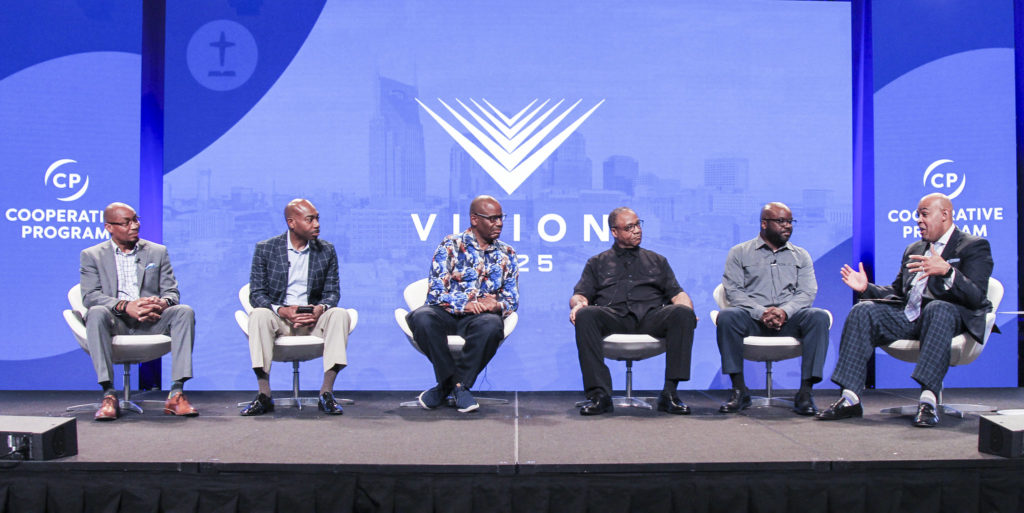
“The proof is in the pudding,” Pastor Reginald Hayes says when prompted to answer why any congregation should be Southern Baptist. “You’re not going to find any other organization that can do it better than the SBC.”
Hayes, senior pastor of United Faith International Church in Columbus, Ohio, and president of the State Convention of Baptists in Ohio, was among five African American pastors addressing “Reaching, Equipping and Mobilizing African American Churches for the Great Commission” on the Vision Stage of the SBC exhibit hall Monday, June 14.
H.B. Charles Jr., senior pastor of Shiloh Metropolitan Baptist Church in Jacksonville, Fla., pointed out a “stewardship of opportunity” for which Christians are responsible.
“There’s a lot of things that may claim the attention of Southern Baptist life, but the core reasons to participate are … Christian education, church planting, world missions and relief efforts,” Charles said. “That doesn’t get talked about, but God is using the SBC in great ways.”
Willie McLaurin, vice president for Great Commission relations and mobilization with the SBC Executive Committee, moderated the 20-minute panel featuring pastors he described as “godly men leading our churches to fulfill the Great Commission.”
Tony Matthews, pastor of North Garland Baptist Fellowship in Garland, Texas, and interim strategist for missional ministry with the Southern Baptists of Texas Convention; Bartholomew Orr, senior pastor of Brown Missionary Baptist Church in Southaven, Miss.; and Erik Cummings, pastor of New Life Baptist Church in Miami and president of the Florida Baptist Convention, completed the panel.
The challenges of adjusting to ministry during the COVID-19 pandemic, such as preaching to empty pews when safety guidelines prevented in-person gatherings, and the importance of discipleship in partnership with evangelism were also discussed.
“When you’re preaching and there’s nobody there, who are you focused on?” Matthews posed. “I just focus on Jesus Christ and let Him do the work.”
Reaching, equipping and mobilizing Asian churches for the Great Commission
By Kirbi Cochran
On the second day of the two-day SBC annual meeting, the Vision Stage panel of Asian American ministry leaders discussed methods to reach, equip and mobilize Asian American churches for the Great Commission.
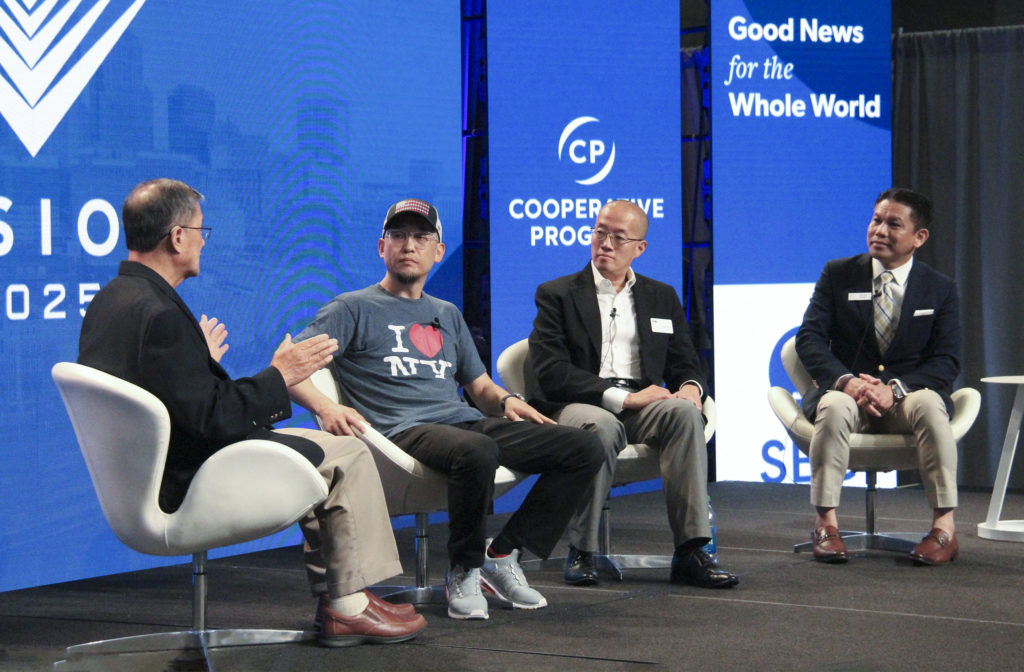
Panel speakers included Peter Yanes, SBC Executive Committee executive director for Asian American relations and mobilization; Victor Hou, International Mission Board associate vice president for global advance; Won Kwak, North American Mission Board Send City missionary; and Paul Kim, pastor emeritus at Antioch Baptist Church in Cambridge, Mass.
The panel represented more than 2,000 Asian American churches and 27 Asian nationalities in the SBC. In order to reach the current population of 23 million Asian Americans as well as all nations for Jesus Christ, Hou discussed efforts by missionaries around the world to reach Asian people groups using methods that consider their cultural backgrounds and religious mindsets. This translates to American churches also, as they attempt to reach first-generation Asian Americans.
Hou stressed the difference between reaching first-generation and second-generation Asian Americans. The IMB is working on new technologies and online content to reach second-generation Asian Americans, who belong to Generation Z.
Kwak, a pastor in New York City, said Southern Baptists have planted 8,200 churches since 2010, and 60 percent of those were non-Anglo. Asian American churches alone accounted for 1,500 of the total number.
“The SBC is just reflecting the shift that has already happened worldwide,” Kwak said. “The face of Christianity is no longer Western or European. It is African, Asian and Latin American.”
Kim encouraged Asian Americans to leverage their status and resources to reach people and plant churches wherever there is a need. He and his wife have helped plant more than 40 churches worldwide. He suggested that churches choose a target group which they will invest in, train up and send out into their workforce and across the world as messengers of the Gospel.
Hou discussed the missionary tasks of the IMB, which follow the process of entering a community, praying to gain access, winning souls to Christ and then discipling them in the faith.
Kwak affirmed the process, saying: “We need to be discipling disciple-making people of God and that’s how it happens within the local church. The resources that we have are phenomenal, and we need to utilize those resources and be together, united and continue to collaborate moving forward.”
In closing, the panel agreed on the importance of mobilizing Asian American churches so that they transition from a mission field to a mission force. Churches are united under the banner of Christ, and they must work together to equip and send out missionaries across the world.
Reaching, equipping and mobilizing Hispanic churches for the Great Commission
By Keila Diaz
Early on the first day of the two-day 2021 SBC Annual Meeting in Nashville, Hispanic leaders discussed reaching, equipping, and mobilizing Hispanic churches for the Great Commission.
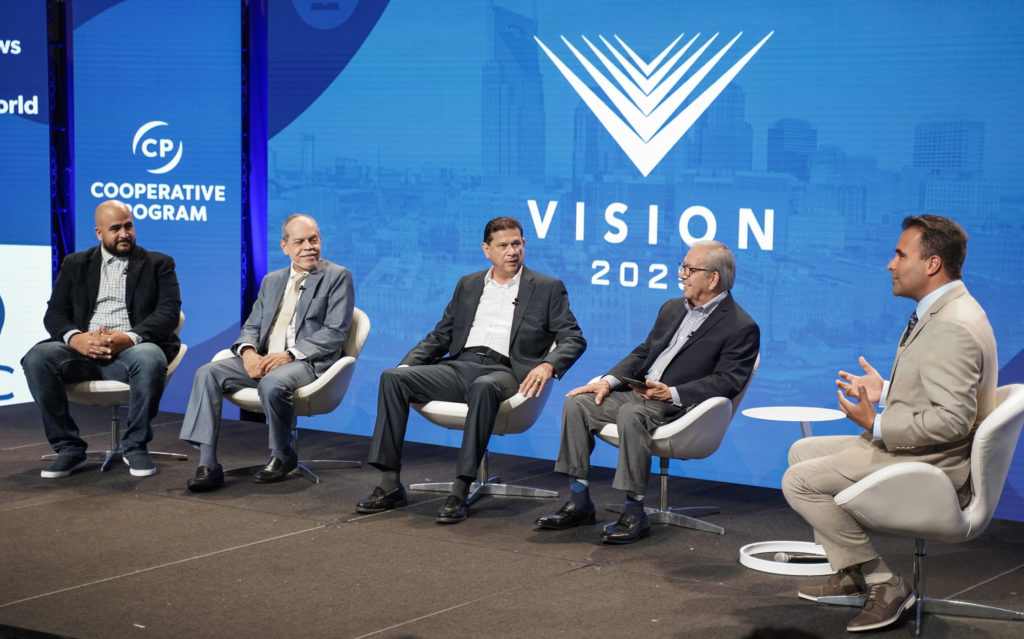
The panel, held on the Vision Stage in the meeting’s exhibit hall, was conducted entirely in Spanish and was moderated by Julio Arriola, executive director of Hispanic relations and mobilization at the SBC Executive Committee.
Panelists included Bobby Sena, director of Spanish studies at Midwestern Baptist Theological Seminary; William Ortega, Hispanic church planting consultant for the Baptist State Convention of North Carolina; Miguel Núñez, pastor, writer and medical doctor; and Felix Cabrera, executive director of the Convention of Southern Baptist Churches in Puerto Rico.
Arriola asked panelists a series of questions covering the role of Hispanic churches in missions, how Hispanic churches can be more effective in planting and evangelizing, the future of Hispanics in international missions, and how to encourage church members to serve on the mission field.
“Instead of adding churches we need to reproduce churches,” Ortega said. “It is essential to reproduce the DNA of healthy churches.” Prayer, he added, is the best strategy to fuel church planting and the sending of believers into the field.
“There has to be a culture of discipleship, equipping and evangelizing,” Cabrera said, “and inevitably we will reproduce and plant new healthy churches that plant other healthy churches.” He then reminded pastors that the church is Christ’s.
Núñez said the international mission field needs Hispanics.
“Hispanics have the opportunity to integrate into the culture of countries in the Middle East better than maybe the Anglo believers can,” he said, adding that the reason is for that is a similarity in both looks as well as some culture and customs.
As churches prepare to plant and send their people, they now have many more resources to train and equip them in Spanish, Sena said. Seminaries like Midwestern offer degrees fully in Spanish and fully online. The challenge, he said, is to find more professors to continue to expand these programs and take quality Spanish-language ministry education even further.




